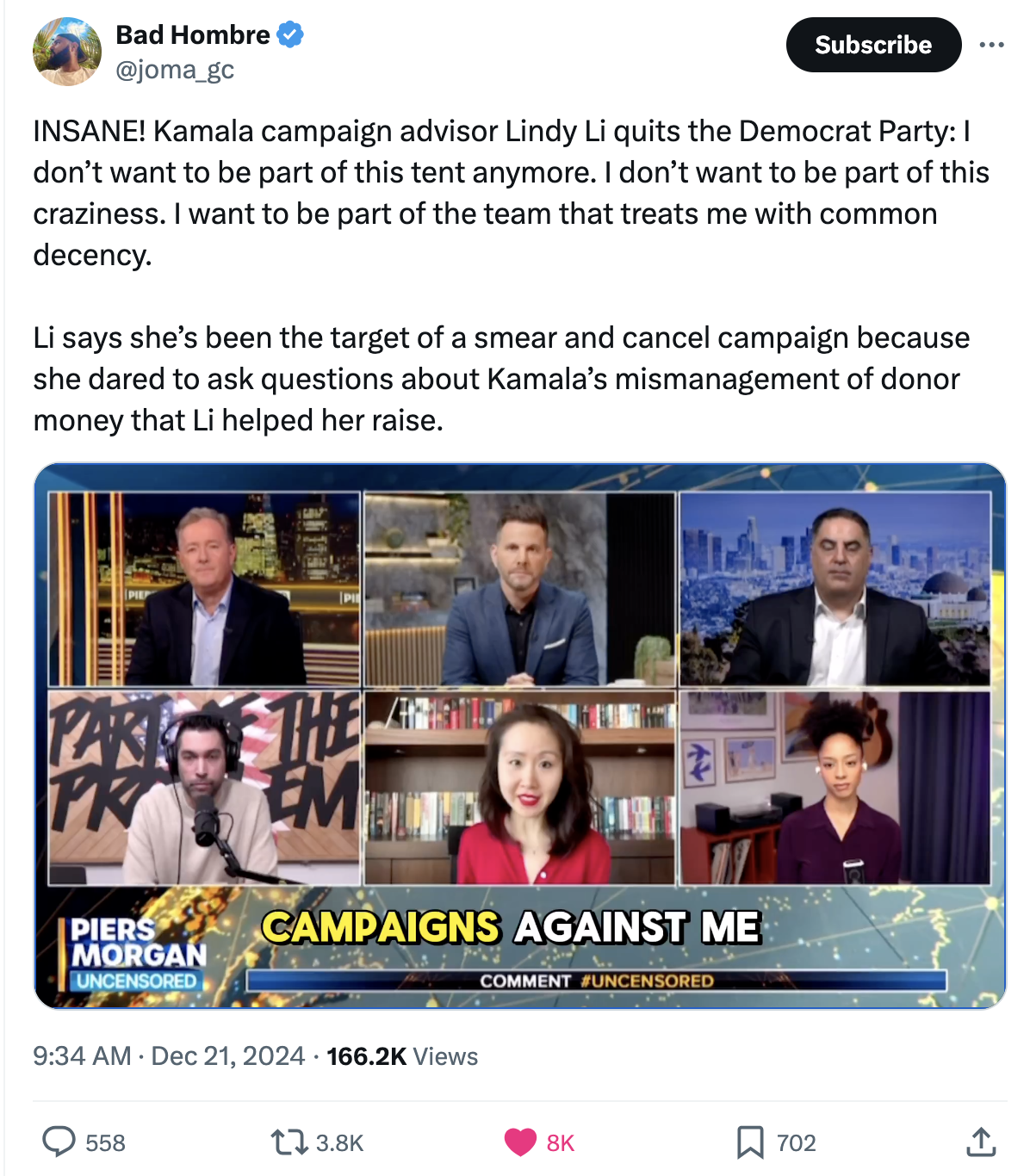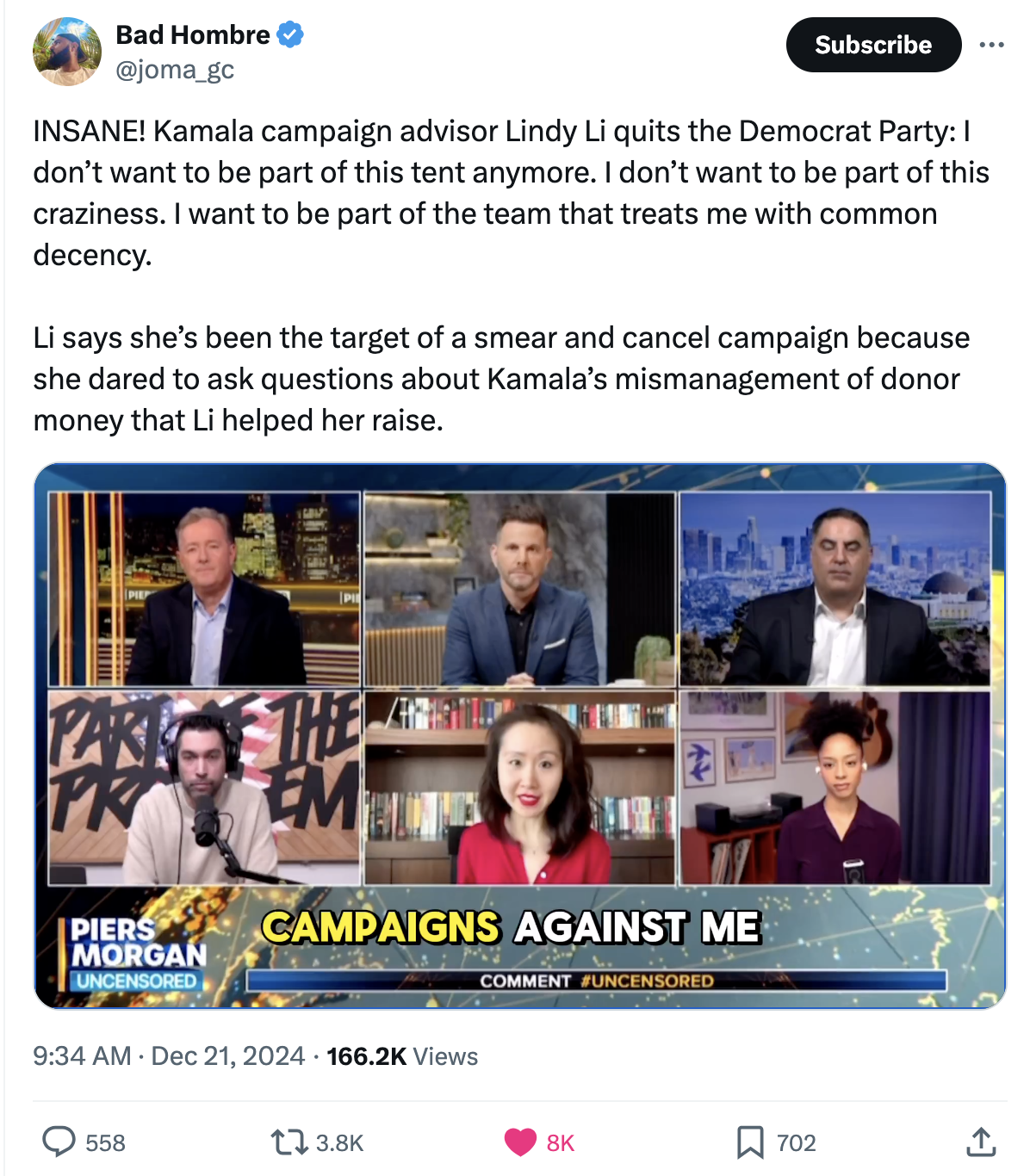I very much admire Coleman Hughes. He bravely stood up to the race-hucksters over the past five years and advocated for the type of color-blindness embraced by almost all classical liberals. But on CNN he naively stepped into an area in which he is not well informed: National Security. Almost everything he says in opposition to Tulsi Gabbard is incorrect and it wouldn't have taken much time to get informed before going live. Very disappointing, but this illustrates something ubiquitous. Everyone I know (even myself) who gets a lot right sometimes falls off the rails. The causes are many: tribalism, hubris, fatigue and failing to be self-critical. It happens to all of us, some of the time and free speech is the best approach we know to limit these missteps. So here is Glenn Greenwald speaking freely about Coleman's embarrassing moment on CNN:

Glenn Greenwald:
There was a panel discussion about why Tulsi Gabbard is this great evil, and the opposition to her was led by Coleman Hughes, who--I don't really understand when he became an expert on foreign policy. He became known speaking, I think, quite insightfully, about things like race and class and the intersection of them. I've been on his show before. He's been on mine.
Suddenly, though, he's now a great expert in the Middle East, he's a vehement supporter of Israel--as much as Barry Weiss or Sam Harris or people like that are. And here he is on CNN, maligning Tulsi Gabbard, who knows 10 million times more about foreign policy in her toenail than Coleman Hughes has in his entire arsenal of knowledge. But here he is expressing why she's such a terrible choice as DNI [Director of National Intelligence].
Coleman Hughes:
It's a very confounding. Look, call me crazy, but I think the Director of National Intelligence should be a person who, A) trusts US intelligence, and B) likes US intelligence. What do we know about Tulsi Gabbard? We know that when Assad gassed civilians in 2017 and our intelligence agencies determined that and Trump decided to strike those facilities, Gabbard doubted that. She doubted the findings of our own intelligence and she went to go visit Assad. And we know that she defends Julian Assange, who released classified informations that imperiled the people we were working with in Afghanistan and the Taliban went out there and were able to kill them one by one. And so, you know, this is exactly the opposite of the person you would want leading national intelligence.
Glenn Greenwald:
He's saying that the only kinds of people you want to lead the intelligence agencies are people who A) trust what they tell you and B) like how they operate. How can any sentient human being who knows anything about the last 25 years of American history, --and even if you want to go back much further--and it's the same thing. But just going back to the last 25 years since the war in Iraq and the run up to it, going all the way through things like Syria and Libya and Russiagate and the Hunter Biden laptop, and all the different ways that these intelligence agencies have interfered in our politics, improperly and based on lies--It's not disqualifying to distrust the intelligence agencies or to dislike how they operate and want to change it. What's disqualifying is to trust the intelligence agencies. How mindless must somebody be to say, "Yeah, I really trust the CIA. I think their pronouncements are all correct."
Oh, the audacity of her to question anything that the CIA was saying about the war in Syria, when the CIA was leading, one of those dirty wars that they love to fight at a billion dollars a year that Obama unleashed them to fight in order to remove Bashar Al Assad from power and replace [him with] someone else they wanted. Oh no, questioning the intelligence agencies. Tulsi Gabbard questioned what they said, doubted some of their pronouncements, and now she's somehow ineligible to lead them, because she doesn't have blind, mindless faith in them.
This is conventional wisdom in Washington. Coleman doesn't know anything about the topics of which he's opining, including what he said about WikiLeaks. And the idea that WikiLeaks is supposed to be considered some sort of nefarious group that nobody can defend when they've done more than anybody to bring transparency to our government, including the lies they told about the wars in which Tulsi Gabbard fought and the corruption of our allies, and all the lies that we've been told as the public about what our government was doing.
The idea that defending Julian Assange for bringing transparency is somehow disqualifying? I'm sure he would say the same thing about Edward Snowden, who Tulsi Gabbard also supports, is just mind-blowingly dumb. But this we showed you this because it's so reflective of how Washington thinks. Coleman Hughes--what he does when he doesn't know what he's talking about, is--he just picks up on conventional wisdom and the world in which he resides with Bari Weiss and those kind of people, he just repeats what that world thinks without an even an inch of knowledge. But it's nonetheless worth seeing, because that is the opposition to Tulsi Gabbard: "Oh, she's not a fan of the CIA. She's not a fan of the NSA. She doesn't think the intelligence agencies like Homeland Security have been doing a good job, have been honest with the American people. This is what Donald Trump ran on. He didn't run on appointing the kind of people that Coleman Hughes thinks should be appointed: people who think the intelligence communities are so trustworthy in whatever they're doing.
[Trump] ran on a campaign promise to uproot them, to fundamentally drain their swamp and to rebuild them into more ethical and trustworthy institutions, and Tulsi Gabbard represents that. The only people scared of her are the people who should be scared, the people who want to keep those institutions in place, despite all the lies they told and the corruption they've imposed, precisely because they're the ones who benefit most from it. But they don't want any one questioning, let alone changing, how Washington works.










